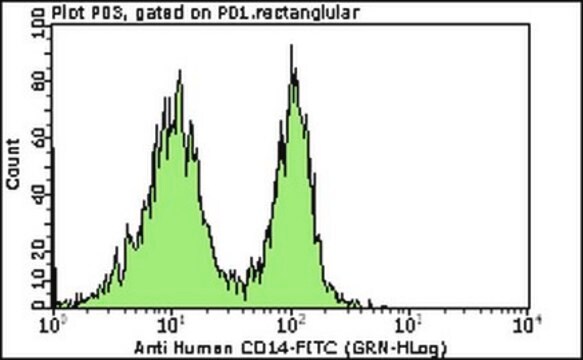추천 제품
생물학적 소스
mouse
Quality Level
항체 형태
purified antibody
항체 생산 유형
primary antibodies
클론
6F, monoclonal
종 반응성
mouse, hamster, chicken, canine, rat, human, monkey
제조업체/상표
Upstate®
기술
electrophoretic mobility shift assay: suitable
immunohistochemistry: suitable
immunoprecipitation (IP): suitable
western blot: suitable
동형
IgG1
NCBI 수납 번호
UniProt 수납 번호
배송 상태
dry ice
타겟 번역 후 변형
unmodified
유전자 정보
human ... ZBTB33(10009)
특이성
Kaiso
면역원
Recombinant N-terminal GST and His-tagged fusion protein corresponding to residues 103-584 of murine Kaiso
애플리케이션
Detect Kaiso with Anti-Kaiso Antibody, clone 6F (Mouse Monoclonal Antibody), that has been shown to work in EMSA, IP, WB & IHC.
Research Category
Epigenetics & Nuclear Function
Epigenetics & Nuclear Function
Research Sub Category
Transcription Factors
Transcription Factors
품질
Immunoblot Analysis: 0.5-2 μg/ml of this antibody detected Kaiso in RIPA lysates from 3T3/A31cells.
Immunohistochemistry: As shown by an independent laboratory, 1μg/ml of this antibody gave positive nuclear immunostaining for Kaiso in NIH 3T3 cells fixed with 100% methanol (Daniel, 2001; Daniel, 1999).
Immunoprecipitation: As shown by an independent laboratory, 2-5μg of this antibody immunoprecipitated Kaiso from RIPA lysates from NIH 3T3 cells (Daniel, 1999; Prokhortchouk, 2001).
Supershift: As shown by an independent laboratory, this antibody will supershift a specific methyl-CpG complex (Prokhortchouk, 2001).
Immunohistochemistry: As shown by an independent laboratory, 1μg/ml of this antibody gave positive nuclear immunostaining for Kaiso in NIH 3T3 cells fixed with 100% methanol (Daniel, 2001; Daniel, 1999).
Immunoprecipitation: As shown by an independent laboratory, 2-5μg of this antibody immunoprecipitated Kaiso from RIPA lysates from NIH 3T3 cells (Daniel, 1999; Prokhortchouk, 2001).
Supershift: As shown by an independent laboratory, this antibody will supershift a specific methyl-CpG complex (Prokhortchouk, 2001).
표적 설명
97kDa
물리적 형태
0.07M Tris-glycine, pH 7.4, 0.105M NaCl, 0.035% sodium azide and 30% glycerol.
Format: Purified
Protein G Chromatography
저장 및 안정성
2 years at -20°C
분석 메모
Control
Positive Antigen Control: Catalog #12-305, 3T3/A31 lysate. Add 2.5 μL of 2-mercapto-ethanol/100 μL of lysate and boil for 5 minutes to reduce the preparation. Load 20 μg of reduced lysate per lane for minigels.
Positive Antigen Control: Catalog #12-305, 3T3/A31 lysate. Add 2.5 μL of 2-mercapto-ethanol/100 μL of lysate and boil for 5 minutes to reduce the preparation. Load 20 μg of reduced lysate per lane for minigels.
법적 정보
UPSTATE is a registered trademark of Merck KGaA, Darmstadt, Germany
면책조항
Unless otherwise stated in our catalog or other company documentation accompanying the product(s), our products are intended for research use only and are not to be used for any other purpose, which includes but is not limited to, unauthorized commercial uses, in vitro diagnostic uses, ex vivo or in vivo therapeutic uses or any type of consumption or application to humans or animals.
Not finding the right product?
Try our 제품 선택기 도구.
Storage Class Code
10 - Combustible liquids
WGK
WGK 1
시험 성적서(COA)
제품의 로트/배치 번호를 입력하여 시험 성적서(COA)을 검색하십시오. 로트 및 배치 번호는 제품 라벨에 있는 ‘로트’ 또는 ‘배치’라는 용어 뒤에서 찾을 수 있습니다.
J M Daniel et al.
Hybridoma, 20(3), 159-166 (2001-07-20)
The POZ-zinc finger protein Kaiso belongs to a rapidly growing superfamily of BTB/POZ zinc finger transcription factors implicated in embryonic development and cancer. Kaiso interacts with the catenin p120(ctn), but the significance of the interaction remains unknown. Although p120(ctn) is
Shun-Dong Dai et al.
Cancer science, 102(1), 95-103 (2010-11-13)
δ-Catenin is the only member of the p120 catenin (p120ctn) subfamily that its primary expression is restricted to the brain. Since δ-catenin is upregulated in human lung cancer, the effects of δ-catenin overexpression in lung cancer still need to be
A Prokhortchouk et al.
Genes & development, 15(13), 1613-1618 (2001-07-11)
We describe a novel mammalian DNA binding activity that requires at least two symmetrically methylated CpG dinucleotides in its recognition sequence, preferably within the sequence 5'CGCG. A key component of the activity is Kaiso, a protein with POZ and zinc-finger
The catenin p120(ctn) interacts with Kaiso, a novel BTB/POZ domain zinc finger transcription factor.
J M Daniel et al.
Molecular and cellular biology, 19(5), 3614-3623 (1999-04-17)
p120(ctn) is an Armadillo repeat domain protein with structural similarity to the cell adhesion cofactors beta-catenin and plakoglobin. All three proteins interact directly with the cytoplasmic domain of the transmembrane cell adhesion molecule E-cadherin; beta-catenin and plakoglobin bind a carboxy-terminal
Shun-Dong Dai et al.
BMC cancer, 9, 178-178 (2009-06-11)
Kaiso has been identified as a new member of the POZ-zinc finger family of transcription factors that are implicated in development and cancer. Although controversy still exists, Kaiso is supposed to be involved in human cancer. However, there is limited
자사의 과학자팀은 생명 과학, 재료 과학, 화학 합성, 크로마토그래피, 분석 및 기타 많은 영역을 포함한 모든 과학 분야에 경험이 있습니다..
고객지원팀으로 연락바랍니다.







